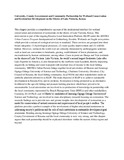University, County Government and Community Partnership for Wetland Conservation and Ecotourism Development on the Shores of Lake Victoria, Kenya

View/
Date
2015Author
Olima, W H A
Hayombe, P O
Nyamweno, I M
Language
enMetadata
Show full item recordAbstract
This chapter provides a comprehensive account of the institutional interface for wetland conservation and promotion of ecotourism on the shores of Lake Victoria, Kenya. This intervention is part of the ongoing Kisumu Local Interaction Platform (KLIP) under the MISTRA Urban Futures Program headquartered in Gothenburg, Sweden. Wetlands are fragile ecosystems which provide a stream of ecological services to mankind. These services are grouped into three broad categories: (1) hydrological processes, (2) water quality improvement and (3) wildlife habitat. However, wetlands the world over are critically threatened by anthropogenic activities such as land use conversion to farmlands, grazing, establishment of forest plantations, and encroachment by human settlements, among others. Cases in point are Dunga and Yala wetlands on the shores of Lake Victoria. Lake Victoria, the world’s second largest freshwater Lake after Lake Superior in America, is also threatened by the stubborn water hyacinth, thereby impacting negatively on fishing and water transport with resultant loss of income to the local fishing community. MISTRA Urban Futures brings together local universities of Maseno and Jaramogi Oginga Odinga University of Science and Technology, Chalmers University (Sweden), City Council of Kisumu, the local fishing community, local NGOs and other stakeholders under an umbrella platform referred to as KLIP. The main objective of KLIP is to achieve sustainable development in Kisumu City and its environs. Ecotourism is being promoted as an alternative livelihood to the age-old fishing and peasant farming practices which have proved to be unsustainable. Local universities are involved in co-production of knowledge in partnership with the local community represented by Beach Management Units (BMUs) and other stakeholders. Currently 20 (10 Ph.D. and 10 Master’s) candidates of Jaramogi Oginga Odinga University of Science and Technology are involved in trans-disciplinary research focusing on ecotourism. The research findings are to provide new and greater insights into development of ecotourism as a model for conservation of natural resources and improvement of local people’s welfare. The platform provides a perfect example of the involvement of higher educational institutions in addressing society’s problems and the role of such institutions in sustainable development goal attainment. Bonding among Jaramogi Oginga Odinga University of Science and Technology, County Government of Kisumu and the local community is now very strong, and this chapter argues that such partnership should be replicated elsewhere within the eastern Africa region and beyond.
Publisher
University of Nairobi
